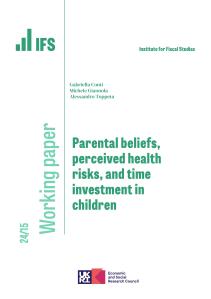We evaluate an intervention targeting early life nutrition and well-being for households in extreme poverty in Northern Nigeria. The intervention leads to large and sustained improvements in children's anthropometric and health outcomes, including an 8 percent reduction in stunting 4 years, post-intervention. These impacts are partly driven by information-related channels. However, the certain and substantial flow of cash transfers is also key. They induce positive labor supply responses among women, and enables them to undertake productive investments in livestock. These provide protein rich diets for children, and generate higher household earnings streams long after the cash transfers expire.
Authors

Research Fellow University College London
Pedro is a Professor of Economics at University College London and an economist in the IFS' Centre for Microdata Methods and Practice (cemmap).

CPP Director, IFS Research Director
Imran is Professor of Economics at University College London and Director of the Centre for the Microeconomic Analysis of Public Policy at the IFS.

Molly Scott

Giacomo Mason

Lucy Kraftman

Lucie Moore
Journal article details
- DOI
- 10.1257/aer.20191726
- Publisher
- American Economic Association
- JEL
- I12, I32, I38, J13, J16, J22, O12
- Issue
- Volume 111, Issue 8, August 2021, pages 2506-49
Suggested citation
Carneiro, P et al. (2021). 'The impacts of a multifaceted pre-natal intervention on human capital accumulation in early life' 111(8/2021), pp.2506–49.
More from IFS
Understand this issue

Sure Start achieved its aims, then we threw it away
15 April 2024

If you can’t see it, you can’t be it: role models influence female junior doctors’ choice of medical specialty
24 April 2024

The NHS waiting list: when will it come down?
29 February 2024
Policy analysis

Recent trends in and the outlook for health-related benefits
19 April 2024

4.2 million working-age people now claiming health-related benefits, could rise by 30% by the end of the decade
19 April 2024

Progression of nurses within the NHS
12 April 2024
Academic research

A senior doctor like me: Gender match and occupational choice
24 April 2024

Parental beliefs, perceived health risks, and time investment in children
15 April 2024

Longer-term impacts of the COVID-19 pandemic on the dietary purchasing choices of British households
4 April 2024